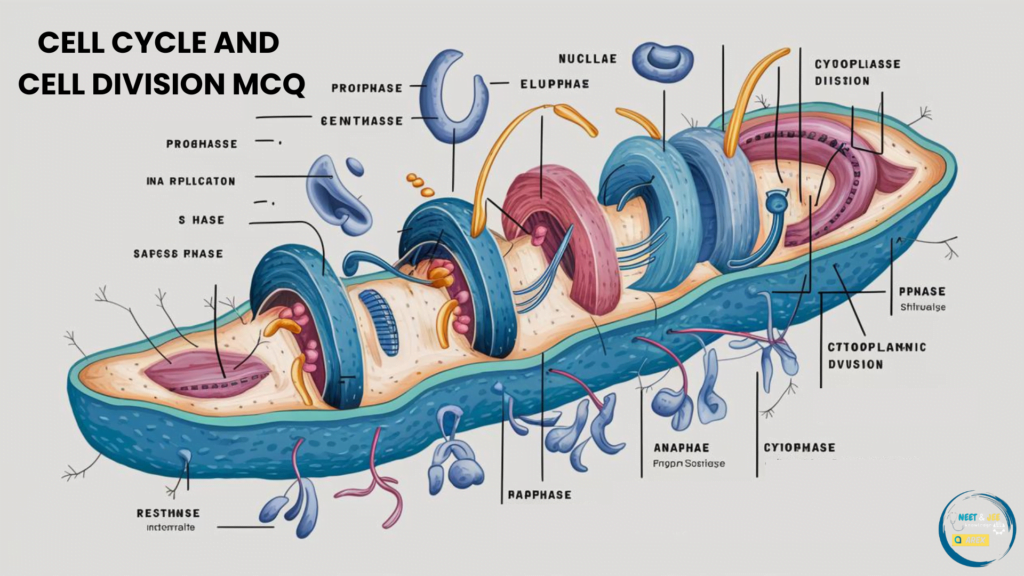
CELL CYCLE AND CELL DIVISION NEET MCQ FOR BIOLOGY
The cell cycle is a series of stages that a cell goes through to grow, replicate its DNA and divide. It consists of interphase and the mitotic phase. Interphase is further divided into three phases: G1 (cell growth), S (DNA synthesis) and G2 (preparation for mitosis).
During interphase, the cell grows and duplicates its genetic material. The mitotic phase includes mitosis, where the replicated chromosomes are evenly divided into two nuclei and cytokinesis, resulting in two daughter cells. This cycle ensures that each daughter cell receives an exact copy of the parent cell’s DNA, maintaining genetic consistency.
Cell division is an important process for growth, development and repair in multicellular organisms. In mitosis, the nucleus of a cell divides to form two identical nuclei. It comprises several stages: prophase, metaphase, anaphase and telophase. During cytokinesis, the cell’s cytoplasm divides, forming two distinct cells.
| NEET 2025 Exam Important Links | |
|---|---|
| NEET 2025 Updated Syllabus | NEET Eligibility Criteria 2025 |
| Biology Preparation | Chemistry NEET Preparation |
| NEET Preparation tips for 2025 | NEET Result 2024 |
CELL CYCLE AND CELL DIVISION NEET MCQ FOR BIOLOGY
The study of the cell cycle and cell division is paramount in the NEET syllabus because it forms the foundation of understanding cellular processes and overall organismal growth and development.
Moreover, the cell cycle and cell division are critical for understanding the pathophysiology of diseases such as cancer, which is characterized by uncontrolled cell division. By studying these topics, students can appreciate how normal regulatory mechanisms prevent errors during cell division and how their failure can lead to disease.
MCQs FOR NEET
Enhance your preparation with Arexiq’s Mock Test Series where we provide solutions to various MCQs like we provide in this post “Cell Cycle and Cell Division NEET MCQ”. Our expert teachers explain the concepts thoroughly, making it easy for you to understand. We offer many types of questions ensuring a clear grasp of concepts.
FAQs CELL CYCLE AND CELL DIVISION
- What are the main phases of the cell cycle?
Answer. The cell cycle consists of interphase (G1, S, and G2 phases) and the mitotic phase (mitosis and cytokinesis).
2. What happens during the S phase of interphase?
Answer. During the S phase, DNA replication occurs, resulting in the duplication of the cell’s genetic material.
3. What is the significance of mitosis?
Answer. Mitosis ensures that each daughter cell receives an identical set of chromosomes, which is crucial for maintaining genetic consistency.
4. How is cytokinesis different from mitosis?
Answer. Mitosis involves the division of the nucleus, while cytokinesis involves the division of the cell’s cytoplasm, resulting in two separate daughter cells.


